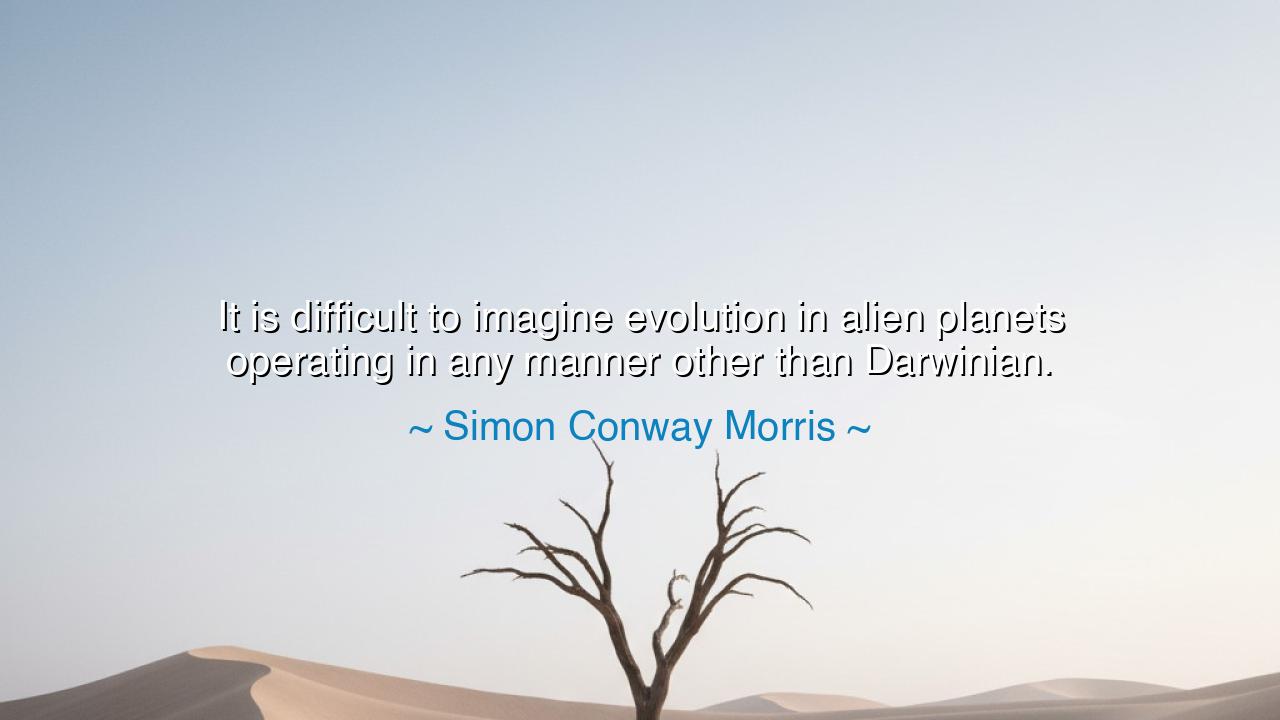
It is difficult to imagine evolution in alien planets operating
It is difficult to imagine evolution in alien planets operating in any manner other than Darwinian.






Children, listen closely to the words of Simon Conway Morris, a thinker who pondered the mysteries of life on Earth and beyond. He said, "It is difficult to imagine evolution in alien planets operating in any manner other than Darwinian." These words, though simple, carry within them a powerful reflection on the nature of life, the forces of change, and the way all beings, whether on Earth or on distant worlds, might be shaped by the very laws that govern existence itself. In these few words, Morris suggests that the process of evolution, that slow and relentless march of life toward greater complexity and adaptation, may not be unique to our own world, but a universal force—one that would likely shape life wherever it might arise in the vastness of the cosmos.
Let us first consider what Darwinian evolution truly is. Charles Darwin, the great naturalist, revealed to the world the process by which life changes over time through the mechanisms of natural selection. In his theory, those who are best suited to their environments—those who have the strength, the adaptability, and the traits that allow them to survive and reproduce—will pass on those traits to their descendants. Over time, this process shapes the diversity of life, creating not just a variety of species but a complex web of life in which each organism is finely attuned to its environment. Morris suggests that, in the grand expanse of space, this same process would apply, for the forces that govern life are likely to be the same everywhere.
Consider the example of the ancient Greeks, who pondered the mysteries of the natural world and laid the foundations of scientific thought. The philosopher Aristotle observed the world around him and believed that all living things had a purpose, a telos, or an end goal, that drove them toward perfection. Though his understanding was primitive compared to Darwin’s, he, too, saw life as a process of growth and change. The ancient Greeks believed in the power of nature to create order from chaos, and while they did not have the framework of Darwinian theory, they sensed that life was a dynamic force, always adapting and evolving. The idea that this process would not be unique to Earth, but rather universal, would not have seemed foreign to them.
Think, too, of the story of Galileo, who, through the use of the telescope, brought forth the truths of the cosmos that shattered the old view of the universe. Galileo’s discoveries showed the universe to be not a fixed, immovable place, but a dynamic, ever-changing expanse. Just as the universe was not confined to the Earth, so too was life not confined to one planet. Morris is suggesting that the same principles of evolution—the struggle for survival, the passing of traits, the shaping of life—would apply across the stars. Just as Galileo’s discoveries expanded our view of the cosmos, so does Morris’s insight expand our understanding of life beyond Earth.
Now, children, let us think about the universe itself. We look up to the stars and wonder about the worlds that lie beyond our own. Could life exist on planets far from Earth? And if it does, how will it evolve? Morris suggests that the same laws of natural selection—those that shaped the rich diversity of life on Earth—would likely operate on other worlds as well. Life on another planet may be different in form, but the driving force behind its evolution would be the same. Just as on Earth, life would face the challenges of its environment, and those that adapted best to those challenges would survive and thrive. It is a powerful thought, children, for it tells us that the principles of life are not limited to the familiar but could be universal, woven into the fabric of existence itself.
But there is a lesson here, children, that is not just about the universe or the planets. The lesson is about life itself, here and now. Evolution is not just something that happens on distant worlds—it happens within each of us. Just as life adapts to its surroundings, so must we. We are all part of the same process of change and adaptation, constantly evolving to meet the challenges of our lives. The traits that we develop, the skills we cultivate, the wisdom we gain—all of these are part of our own personal evolution. Just as the creatures of the Earth face the forces of nature, so too must we face the forces of our own lives. And just as natural selection favors those best suited to their environments, so does the world reward those who adapt, grow, and thrive in the face of adversity.
The lesson here, children, is that life—whether on Earth or on faraway planets—is a journey of evolution. It is a path of constant change, where we must always be ready to adapt, to face new challenges, and to grow. And though we may not know what lies beyond the stars, we can know that the same principles that guide life on Earth will guide us in our own lives. Like the creatures that survive through adaptation and resilience, we too must rise above our difficulties, always striving to be better, to be stronger, to be more than we were before.






AAdministratorAdministrator
Welcome, honored guests. Please leave a comment, we will respond soon